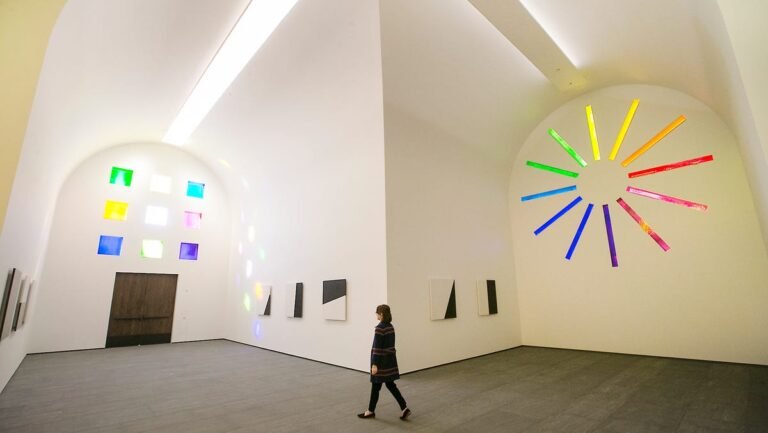As late as the 1930s, precious few Austin buildings came with the gift of air conditioning.
A few movie theaters. Some hotels and motels. At least one department store — Scarbroughs on Congress Avenue at West Sixth Street.
And, boy, did those businesses advertise their ethereal advantages. One can still spot signs, often painted in cool blue or green, blasting out the message of “free AC” on the sides of old tourist courts and other pre-World War II establishments.
Otherwise, the sweaty masses — meaning everybody — were hardly better off inside four walls during the six unofficial months of summer, calculated as April 15 to Oct. 15.
Nowadays, almost all indoor spots are air cooled.
What if you want to add art? The city’s dozens of art galleries offer temptingly chilly options, but their hours are variable, and they show a limited number of artworks. Then it’s back to the outdoor oven.
That leaves museums. Austin hosts several sizable history and literary museums — LBJ Presidential Library, Bob Bullock Texas State History Museum, Harry Ransom Center, Briscoe Center for American History, Capitol Visitors Center and Austin History Center, among them — and at least one gracefully revived science hall, Texas Science & Natural History Museum, and a fun children’s museum with scientific elements, The Thinkery.
As for indoor museums dedicated exclusively to art, these are 5 you just can’t miss:
Not just giant metal lilies (Blanton Museum of Art)
All eyes are on the charismatic metal shapes that rise like fountains or flowers from the Moody Patio at the Blanton Museum of Art on the north end of the newly completed Capitol Mall. Yet while these shade features promise hours of future communing in the plaza, especially after Justine’s bistro joins the mix in 2025, don’t forget the art inside. After picking up tickets in the west building, start with Ellsworth Kelly’s “Austin,” the chapel-like structure that invites the visitor to linger quietly as colors cascade down the white walls with the movements of the sun. Then enter the museum proper. Pause to soak up the blues of Teresita Fernández’s “Stacked Waters” wrapped around the walls of the atrium. Downstairs, visit the special temporary exhibits; upstairs, the city’s most thorough permanent collection.
(Blanton Museum of Art. 200 E. Martin Luther King Jr. Blvd., blantonmuseum.org)
Making downtown cooler by the minute (The Contemporary Austin)
While the city’s primary museum devoted to recent art is rooted in its historic Laguna Gloria home with its growing Betty and Edward Marcus Sculpture Park, that paradise can grow hot and humid midsummer despite the generous shade. Downtown, however, at The Contemporary Austin — Jones Center, you are safe. Two floors of recent artworks, increasingly accompanied by video and film, make for the perfect museum experience, not too long, not too short. Take some time in the shade across West Seventh Street to take in Manik Raj Nakra’s mythic and apocalyptic mural, “Man Who Fell to Earth,” painted onto the side of The Contemporary.
(The Contemporary Austin — Jones Center. 700 Congress Ave. thecontemporaryaustin.org)
Austin by way of Mexico (Mexic-Arte Museum)
From its roots in 1980s community arts, Mexic-Arte Museum has stayed true to its generously broad vision of Mexican and Mexican American art. Director Sylvia Orozco has employed her longtime ties to major artists in Mexico City as well as her links to Borderland makers to ensure this museum’s art reflects traditional high and low culture as well as everything in between. Critics might complain about inconsistent shows and long-delayed dreams of a better physical setting at Congress Avenue and East Fifth Street, but meanwhile the art teaches and pleases.
(Mexic-Arte Museum. 419 Congress Ave. mexic-artemuseum.org)
A gallery, a museum or a community center? (Women & Their Work)
Another spot with a longtime community function, Women & Their Work has advocated for women artists since the 1970s with the highest level of stewardship. The move to improved quarters on East Cesar Chavez Street connected the group to artists and their studios, which have shifted mainly eastward during the past few decades. W&TW continues to feel like a small, highly refined museum that submits periodic opportunities to collect art and gather socially in its splendid home and garden.
(Women & Their Work. 1311 E. Cesar Chavez St. womenandtheirwork.org)
A garden with an indoor option (Umlauf Sculpture Garden & Museum)
How can a sculpture garden qualify as an escape from the heat of the day? Don’t forget that the Umlauf Sculpture Garden & Museum includes a graceful interior gallery that almost always presents some of the best shows in the city, including rare solo outings by sculptors who might be snubbed by other museums. If you go early or late in the day, the shaded garden, which features the work of the late Charles Umlauf, once a teacher at the University of Texas, is more than tolerable.
(Umlauf Sculpture Garden & Museum. 605 Azie Morton Road, www.umlaufsculpture.org)

